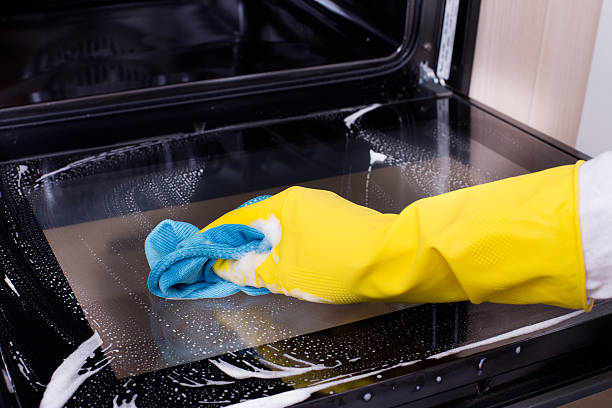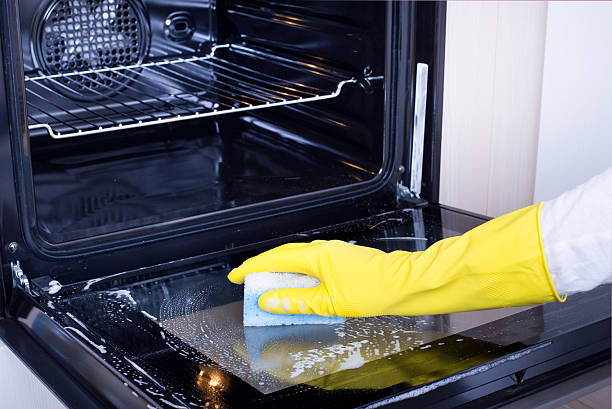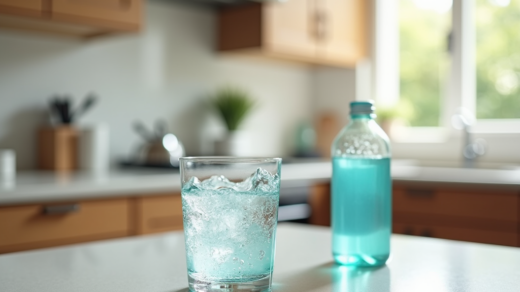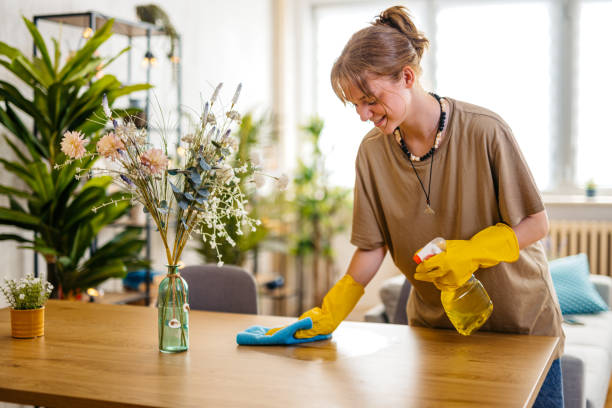It’s a familiar tale: your oven glass gradually loses its transparency, becoming so dirty it’s hard to peer through. While many default to the ubiquitous method of sprinkling baking soda then wiping away the grime, this approach is not always the best. Some self-cleaning ovens actually advise against using baking soda because it can harm the interior glass surface. Other times, you might find the soda mixture barely touches the baked-on splatters, the grime simply not working itself loose. The main topic we’re addressing is how to achieve the same, if not better, results without leveraging the commonly-prescribed soda paste.
Why Avoid Baking Soda?
Baking soda can be abrasive, and over time, you may find that it scratches or dulls the glass. There’s also the aspect of residue; baking soda does not always dissolve completely and can leave behind a white, powdery film that requires additional cleaning. Plus, if you’re working with a chemical cleaner at the same time or shortly after, mixing baking ingredients with certain chemicals is a no-go for safety reasons.

Benefits of a Sparkling Oven Glass
Having a crystal-clear oven glass is not purely aesthetic. It allows you to monitor your food as it cooks, preventing the need to open the door constantly, which can result in heat loss and altered cooking times. Moreover, a clean oven glass reflects on the overall cleanliness of your kitchen, giving off the impression of a well-maintained and hygienic space—a good way to impress guests and a boost to your cooking enjoyment.
Pre-Cleaning Preparation
Before diving into the cleaning process, safety and preparation are paramount. You will need to gather the right tools and protect yourself to perform a deep clean that will not undermine your oven’s functionality or your health.
Safety First: Ensuring a Secure Cleaning Process
Always make sure your oven is cool to the touch and turned off before you begin. Wearing gloves can protect your hands from harsh oven cleaners and prevent fingerprints on the outer glass during the clean-up. Setting down newspapers or a cloth to catch drips will make the process tidier and protect the floor beneath.
You Will Need: Essential Tools and Alternatives to Baking Soda
The key to a baking soda-free clean lies in the alternatives we’ll employ. Here’s a basic list of the supplies you’ll need:
- White vinegar or a suitable acid like lemon juice.
- Dish soap or a gentle degreaser.
- A spray bottle to apply your solution.
- Microfiber cloths or soft sponges to prevent scratching.
- A razor blade or plastic scraper for stubborn gunk.
- Oven cleaner (optional, for particularly persistent stains).
You can also use commercial cleaning solutions specifically formulated for oven doors or create a mild homemade solution using common household ingredients.
Step-by-Step Oven Glass Cleaning Methods
Method 1: Using White Vinegar and Dish Soap
White vinegar, known for its disinfectant properties, can act as a potent cleaning agent when combined with the grease-cutting power of dish soap. This concoction will not damage your oven racks or the interior glass and is typically safe for self-cleaning ovens as well.
| Ingredient | Amount |
|---|---|
| White Vinegar | 1/2 cup |
| Warm Water | 2 cups |
| Dish Soap | 5 drops |
Step-by-Step Instructions for the Vinegar and Soap Method
- Mix one part white vinegar with four parts warm water in a spray bottle.
- Add a few drops of dish soap to the mixture and shake gently to combine.
- Spray the solution generously over the oven glass and let it sit for a good 10-15 minutes.
- Use a microfiber cloth to gently scrub the surface of the glass. If the dirt persists, carefully use a plastic scraper or razor blade to coax it off.
- Wipe away the residue with a clean, damp cloth to reveal a shining surface.
- If streaks remain, consider using a fresh mixture of equal parts vinegar and water for the final touch.

Method 2: Utilizing Lemon and Water
Lemon’s natural acidity makes it excellent for breaking down tough oven grease and grime. It’s a refreshing, non-toxic way to clean the glass and can be particularly useful if the oven is not working, as the fresh scent combats any residual odors.
Step-by-Step Instructions for the Lemon Water Method
- Squeeze the juice of two lemons into a bowl and mix with one cup of water.
- Apply the mixture to the interior glass of the oven, ensuring to cover all greasy spots and splatters.
- Allow the solution to rest for 30 minutes; the acidity of the lemon will help dissolve the grime.
- After soaking, take a sponge or microfiber cloth and gently scrub the glass in circular motions.
- For areas that can’t seem to shake the grime, use a non-abrasive scraper with care, ensuring not to scratch the glass.
- Rinse thoroughly with water and dry with a clean towel for a sparkling finish.
Method 3: Commercial Oven Cleaners
For those relentless spots that home remedies can’t tackle, it may be time to employ a more potent solution. There are numerous commercial oven cleaners available, carefully formulated to take on the toughest baked-on food residue.
Choosing the Right Product
When shopping for oven cleaners, look for products specifically designed for oven glass that are less abrasive. Read reviews and check labels for any necessary safety precautions.
How to Safely Apply Commercial Cleaners
- Don your protective gloves and open any windows to ensure good ventilation, as commercial cleaners can emit strong fumes.
- Apply the cleaner to the oven glass according to the manufacturer’s instructions—some may require a preheated oven, while others work on cool surfaces.
- Allow the cleaner to sit for the time specified. This is usually between 10 minutes to a few hours, depending on the product.
- Once the cleaner has had time to work, use a sponge or cloth to gently scrub away the residue.
- Thoroughly wash off the cleaner with water, repeating if necessary, until the glass is clear and streak-free.
- Buff the oven glass with a dry cloth or paper towel for a final polish.
Aftercare and Maintenance
To keep your oven glass looking great, regular maintenance is key. Incorporating simple cleaning habits can prevent the build-up of stubborn stains in the long run and reduce the need for extensive cleaning sessions.
Daily Habits for a Gleaming Oven Glass
Cleaning spills as soon as they cool can make a significant difference in the overall tidiness of your oven glass. It’s also a good idea to wipe down the glass after each use with a damp microfiber cloth to remove any immediate smears or residue.
When to Seek Professional Cleaning Services
If your oven glass becomes unusually foggy between the double panes of glass, or if you notice issues that aren’t resolved by any of the above methods, it may be time to consult a professional. A certified technician can take apart your oven door and perform a thorough clean, as well as check for any seals that might be compromised.

Conclusion: Enjoy Your Shimmering Oven Glass
Armed with these insights and techniques, you have the power to restore your oven glass to its original glory without resorting to baking soda. Whether you opt for natural, homemade mixtures or specially tailored oven cleaners, regular care will ensure that your oven glass remains a clear window to your culinary magic. And should you face persistent or unusual stains, remember that professional services are always an option.
FAQs
Can I clean my oven glass with just water?
A. Water alone will not typically remove greasy build-up and baked-on food from oven glass. For effective cleaning, using additives like vinegar or lemon juice with water helps break down the grime.
How often should I clean my oven glass?
A. It’s best to clean your oven glass every few months, or whenever you notice build-up occurring. Frequent light cleanings can prevent the need for heavier scrubbing down the line.
What if there are stubborn stains on my oven glass?
A. For particularly stubborn stains, consider using a commercial oven cleaner designed for tough grime. If that still doesn’t work, a professional cleaning service may be necessary.
Are there natural alternatives to commercial cleaners?
A. Absolutely! Vinegar, lemon juice, and even water combined with a drop of dish soap are effective, natural alternatives to commercial oven cleaners.
Can scratches on oven glass be removed during cleaning?
A. Unfortunately, once the glass is scratched, it’s usually permanent. However, maintaining a gentle cleaning technique can help prevent scratches from occurring.
With this cleaning knowledge at your fingertips, achieving and maintaining an impeccably clear oven glass can become a simple, satisfying aspect of your kitchen routine.


